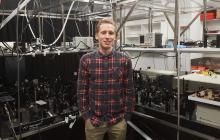SCPS student receives Cambridge Rutherford Memorial PhD Scholarship
Alexander Sneyd, a former Honours student at the School of Chemical and Physical Sciences, has received a Rutherford Foundation Trust scholarship to pursue a PhD at the University of Cambridge investigating the fundamental physics of alternative solar cell materials such a perovskites and organic semiconductors.

Alexander will pursue his research topic entitled 'Application of Metal Halide Perovskites and Organic Semiconductor Materials to Photovoltaic Devices' and he will join the Optoelectronics group led by Professor Sir Richard Friend at the University of Cambridge. He will work with leading experts in optoelectronics, and his research will ideally go towards solving one of the world's most critical issues; climate change and how we can effectively harness solar power for the good of the planet.
Solar cells made from metal halide perovskites are one possibility. They have seen a remarkable increase in solar cell efficiency from 3.8% in 2009 to a competitive 22.1% in early 2016, with some promises to even reach up to 30%. Crucially, their low-cost and easy fabrication – they can be “printed” – means they can be competitive commercially. Another great potential candidate for low-cost solar cells are organic semiconductors. These materials have attracted interest due to their ingenious ability to ‘split’ single electrons into two electrons, boosting the amount of electricity that can be produced.
For both perovskites and organic semiconductors, there is still much work needed, especially around improving stability and efficiency, lowering toxicity, and finding the right materials to use in tandem. We also need to fully understand the fundamental processes that play out, and how exactly electrons in these materials respond to sunlight.
